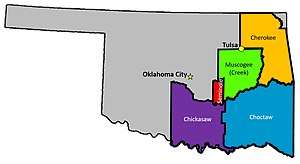McGirt v. Oklahoma
McGirt v. Oklahoma (Docket 18-9526) is a pending United States Supreme Court case that raises the question of whether Congress disestablished Native American reservation in Oklahoma. It is related to another pending Supreme Court case, Sharp v. Murphy (Docket 17-1107) heard in the 2018–19 term on the same question, but which is believed to be deadlocked due to Justice Neil Gorsuch's recusal due to having prior judicial oversight of the case.
| McGirt v. Oklahoma | |
|---|---|
 | |
| Argued May 11, 2020 | |
| Full case name | Jimcy McGirt, Petitioner, v. Oklahoma |
| Docket no. | 18-9526 |
| Case history | |
| Prior | Denial for relief, PC-2018-1057 (Okla. Crim. App. Feb. 25) (2019); Cert. granted, 140 S. Ct. 659 (2019) |
| Court membership | |
| |
Background

Prior to its statehood in 1907, about half of the land in Oklahoma in the east, including the Tulsa metro area today, had belonged to Five Civilized Tribes. There had been several decades of warfare, conflict and negotiations during the 19th century over these lands between the Native Americans and the United States, but by 1906, the United States Congress passed the Oklahoma Enabling Act, which had been taken to disestablish the reservations, and enabling Oklahoma's statehood.
In Sharp v. Murphy, Patrick Murphy, a descendant of the Native Americans, admitted to committing murder in the state of Oklahoma, and was subsequently tried by the state courts. During these trials, Murphy argued that the language of the Oklahoma Enabling Act did not specify that the Native American reservations were disestablished, and because he had committed the murder within the Muscogee reservation territory, that his crime was subject to federal jurisdiction and not state under the Major Crimes Act. This argument was rejected by the state and on its first appeal within the federal courts, but at the Tenth Circuit in 2017, the court found in favor of Murphy's argument that the Enabling Act did fail to disestablish the territories, and thus Murphy should have been prosecuted by the federal courts. The state petitioned to the Supreme Court in 2018, which accepted to hear the case. However, as Justice Neil Gorsuch was part of the Tenth Circuit panel that heard the case on appeal, he recused himself from all hearings on the case. With only eight Justices hearing the case, the case remained unresolved at the end the of 2018–2019 term; the Court had stated plans to hold another hearing on the case in the 2019–20 term but had not set a date. Many court analysts believed the case to be deadlocked due to Gorsuch's recusal.[1][2]
Statements of the case
Jimcy McGirt had been tried and convicted of performing sex crimes against an underage child in 1996 in Oklahoma, and was serving a life sentence for the crime. When the Tenth Circuit delivered its verdict on Murphy's case in 2017, McGirt was one of several convicts who had similar cases to Murphy's, Native American descendants that had been tried and convicted in state courts for crimes committed on lands that were part of the former reservations, who sought appeals based on the new ruling from the Tenth Circuit after the state denied him relief.[1] The Supreme Court granted McGirt's petition in December 2019.[2]
Supreme Court
McGirt was one of a dozen cases that the Supreme Court opted to use teleconferencing for oral arguments for the first time in the court's history due to the COVID-19 pandemic.[3] The arguments for McGirt were heard on May 11, 2020. Observers to the court stated that some Justices raised concerns of what ruling in favor of McGirt, in recognizing that the reservations were never disestablished, would impact not only existing convicted prisoners within the state but how the federal courts would subsequently need to handled approximately 8000 felonies that occur annually on those lands, as well as the impact on legal matters related to businesses and other civil actions that would fall under tribal regulations than state. Attention was given to Justice Gorsuch's stance who appeared to doubt Oklahoma's stance that the lands were effectively disestablished. Justice Sonia Sotomayor stated that should the Court find in favor of McGirt, in that the reservations were never formally disestablished, that Congress would be able to easily remedy the situation with legislation to affirm that.[4][5]
References
- Nagel, Rebecca (May 8, 2020). "Oklahoma's Suspect Argument in Front of the Supreme Court". The Atlantic. Retrieved May 11, 2020.
- Liptak, Adam (December 13, 2019). "Supreme Court to Rule on Whether Much of Oklahoma Is an Indian Reservation". The New York Times. Retrieved May 11, 2020.
- Liptak, Adam (April 13, 2020). "The Supreme Court Will Hear Arguments by Phone. The Public Can Listen In". The New York Times. Retrieved May 11, 2020.
- Liptak, Adam (May 11, 2020). "Supreme Court Weighs Whether Much of Oklahoma Is an Indian Reservation". The New York Times. Retrieved May 12, 2020.
- Hurley, Lawrence (May 11, 2020). "U.S. Supreme Court weighs Oklahoma tribal authority dispute". Reuters. Retrieved May 12, 2020.